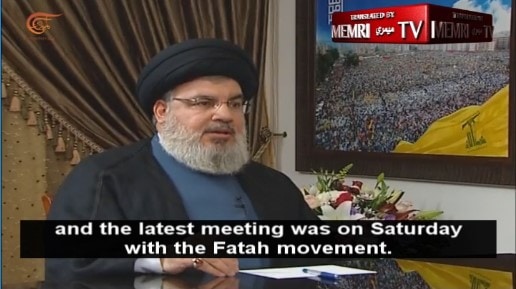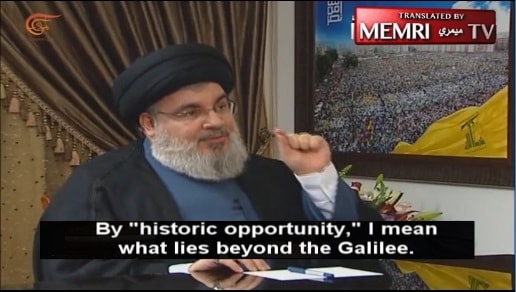Hizbullah secretary-general Hassan Nasrallah played down the situation in Iran, saying that what has happened there "is being successfully contained" and that "in my opinion there is nothing to be worried about." Speaking on Mayadeen TV, in an interview that was broadcast on January 3, he further said that he had met with Fatah leaders, as well as with the other Palestinian factions, in order to discuss cooperation and support for the Intifada. In the event of a large-scale war, he said, we must be prepared so that it will become "an opportunity to liberate Jerusalem, and not just the Galilee."
To view the clip on MEMRI TV, click here or below.
"With Regard To Iran, In My Opinion There Is Nothing To Be Worried About – What Has Happened In Iran Is Being Successfully Contained"
Hassan Nasrallah: "With regard to Iran, in my opinion there is nothing to be worried about. What has happened in Iran is being successfully contained. This does not compare to anything that has happened in the past. It is much less than the incidents that occurred in 2009.
[...]
"Unlike in 2009, the basic problem is not a political one.
[...]
"The situation was severe in 2009 because the conflict was within the regime, between the various forces within the regime.
[...]
"Today, the problem is not within the regime. On the contrary, the different forces within the regime have united to confront the current problem. The problem has an entirely different background this time. It started when a group of banks or financial investment firms went bankrupt. This is something that can happen in any country.
[...]
"At the end of the day, regardless of the background, you should consider the scope of the protests. In Iran, there are 80-90 million people. How many took to the streets? A thousand here and a thousand there? Brother, let's even say 10,000 people – although the number wasn't anything like that. What took things out of proportion were the riots, the burning of property, and the fact that some people have used hunting rifles. Then matters developed, and [Khamenei] talked about foreign interference. We saw how Trump immediately made a statement, his VP made a statement, and so did their representative in the U.N. Netanyahu joined in, in person. Saudi Arabia views this as its own war. The Saudi media went into war. Their entire media was focusing on Yemen and has now shifted to Iran.
"They have taken these [protests] out of proportion, and are pinning great hopes on them. But I think that the Iranian leaders have dealt with this calmly and wisely.
[...]
"The greatest popular base, the greatest popular support, has been behind the foreign policies of the Islamic Republic regime from the start.
[...]
"When the [Iranian regime] says to the citizens: If we do not help the Syrians, Iraqis, and Lebanese to fight ISIS and the takfiri forces, the war will be fought on the borders of Iran, and in Tehran, in Tabriz, and in Mashhad – and there is evidence of that... So there is very significant popular conviction in the current policies. Therefore, this will not affect the support for the Islamic Republic leaders.
[...]
"I would like to reassure the public of the resistance axis. They should not worry, and should not be affected by what is published in some media outlets, which are taking this out of proportion.
[...]
"I [recently] met with the PFLP, the PFLP-GC, the Fath Al-Intifada movement – this was the chronological order – the As-Sa'iqa organization, the PPSF, Hamas, the DFLP, the Islamic Jihad, and the latest meeting was on Saturday with the Fatah movement.

[...]
"The Fatah delegation was led by Azzam Al-Ahmad, and included a group of Fatah leaders."
[...]
"The Main Issue Right Now Is The Intifada Within Occupied Palestine And The Accompanying Activity Abroad"
"Whether 'from the River to the Sea' or the 1967 borders, whether Jerusalem in its entirety or just East Jerusalem, the refugees, the West Bank borders, negotiations or no negotiations – we put all this aside. We said that the heart of the Palestinian cause, Jerusalem, is being targeted, so let us cooperate. This was the spirit of all the factions.
[...]
"We consolidated the principle of cooperation between all the factions on all fronts."
Interviewer: "For what purpose?"
Hassan Nasrallah: "The main issue right now is the Intifada within occupied Palestine and the accompanying activity abroad."
Interviewer: "How? With demonstrations?"
Hassan Nasrallah: "Within occupied Palestine it is about direct confrontation, obviously. We all know what Intifada means."
[...]
Interviewer: "Is there any financial and military aid for the Intifada?"
Hassan Nasrallah: "I'm getting there. From outside Palestine, all types of aid are required: demonstrations, media, policies, the rise of the peoples of the region, and even in the outside world – we should all benefit from our ties and our communities there. We talk about media support, political support, financial support... This is very natural. When you talk about an Intifada, you try to secure... "

Interviewer: "Direct financial aid for the organizations with which you met?"
Hassan Nasrallah: "For the organizations or even for the activity inside [Palestine]. For example, in the past, the financing came from the Islamic Republic. During what was called the Jerusalem Uprising, financial compensation was given to families of people martyred, wounded, or imprisoned. When a house was demolished as a result of a stabbing operation, for example, the family would get compensation in order to secure alternative housing. This kind of support will continue and increase."
[...]
Interviewer: "I am surprised to hear about the PFLP. The PFLP is now getting aid, like the other factions, from Iran? And through you?"
Hassan Nasrallah: "We are not mediators for providing financial support."
Interviewer: "Why, what's wrong with that?"
Hassan Nasrallah: "Nothing, but there is no need for that. The Islamic Republic is proud to fulfill its duty, when it provides aid to the Palestinian resistance factions. It's not that they need a mediator to avoid the consequences. They are doing it out in the open."
[...]
"Hundreds Of Thousands [Of Fighters] Would Take Part In Such A War – We Are Preparing For This"
Interviewer: "Let us be clear. The support for the Intifada within [Palestine] consists of popular and financial support only? There is no support in weapons?"
Hassan Nasrallah: "As far as we are concerned, the support in weapons has never stopped. It has nothing to do with Trump's decision about Jerusalem. The resistance inside Palestine should have the necessary weapons and the necessary military capabilities. This is our unwavering platform. It is not a reaction to a decision here or a diplomatic or political measure there."
Interviewer: "So it continues to this day."
Hassan Nasrallah: "It does. Our decision about this is final, and the program is working. It depends on the circumstances not on our decision. This is our unwavering policy. The resistance in Palestine needs weapons and capabilities, and whenever we get an opportunity, we do not hesitate.
[...]
"I am not making speeches just as a form of psychological warfare. I said that in the event of a future war in Lebanon, the war would not be just against Hizbullah. Hundreds of thousands [of fighters] would take part in such a war. We are preparing for this.
[...]
"It is the responsibility of the resistance axis – countries, movements, peoples, and factions – to prepare itself. We have nothing to lose by preparing ourselves, so we won't be taken by surprise. Our minimal duty is to prepare so that if the day comes when a war breaks out, we will be able to turn this war from a historic threat to a historic opportunity."
Interviewer: "You gave us a general title..."
Hassan Nasrallah: "By 'historic opportunity,' I mean what lies beyond the Galilee.

[...]
"If Trump or Netanyahu want to push the region into a large-scale war, we should study and examine [the options], and prepare ourselves... Why did I talk about 'beyond the Galilee'? Let that large-scale war that will be forced upon us all become an opportunity to liberate Jerusalem, and not just the Galilee."
[...]
"I Said To The Mujahideen Of The Resistance: Prepare Yourselves For A Day When You May Be Asked By The Command Of The Resistance To Enter The Galilee, Or To Liberate It"
"I declared that in the next war, we would have hundreds of thousands [of fighters], and a few days later, Abdul-Malik Al-Houthi declared, live on TV, that he and the Yemeni Jihadi forces were ready to be a part of that war. Moreover, in the framework of our contacts, I received a direct message, after my speech and before Abdul-Malik Al-Houthi announced it on TV. The message was: In the event of a war, and if you need forces, we are ready to send tens of thousands of fighters, even if the Saudi-American war against us has not yet come to an end.
[...]
"I said to the mujahideen of the resistance: Prepare yourselves for a day when you may be asked by the command of the resistance to enter the Galilee, or to liberate it. As for what lies beyond the Galilee, it is connected to the general idea. If a large-scale war erupts in the region, anything will be possible.
[...]
"Regardless of the number of missiles we possess, trust me: You do not need 100,000-200,000 missiles to defeat the Israeli enemy. This is what terrifies the Israelis. They themselves say this.
"The Israelis themselves say: 'Hizbullah does not need 100,000 missiles. If Hizbullah has several dozen accurate missiles, and if it selects its targets accurately, it will inflict a great catastrophe upon us.'"




